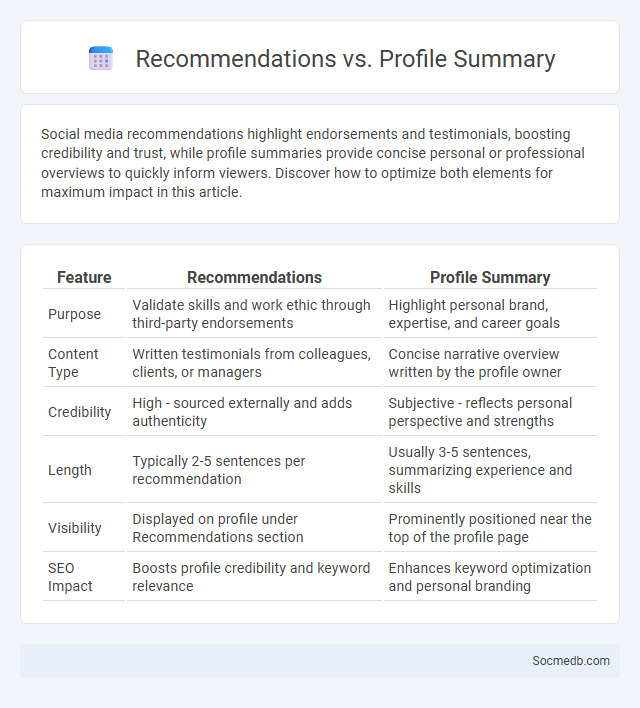
Photo illustration: Recommendations vs Profile Summary
Social media recommendations highlight endorsements and testimonials, boosting credibility and trust, while profile summaries provide concise personal or professional overviews to quickly inform viewers. Discover how to optimize both elements for maximum impact in this article.
Table of Comparison
| Feature | Recommendations | Profile Summary |
|---|---|---|
| Purpose | Validate skills and work ethic through third-party endorsements | Highlight personal brand, expertise, and career goals |
| Content Type | Written testimonials from colleagues, clients, or managers | Concise narrative overview written by the profile owner |
| Credibility | High - sourced externally and adds authenticity | Subjective - reflects personal perspective and strengths |
| Length | Typically 2-5 sentences per recommendation | Usually 3-5 sentences, summarizing experience and skills |
| Visibility | Displayed on profile under Recommendations section | Prominently positioned near the top of the profile page |
| SEO Impact | Boosts profile credibility and keyword relevance | Enhances keyword optimization and personal branding |
Understanding Recommendations in Professional Profiles
Understanding recommendations in professional profiles enhances your credibility and strengthens your network by showcasing genuine endorsements from colleagues and clients. These recommendations highlight your skills and experiences, making your profile more attractive to recruiters and potential collaborators. Leveraging authentic feedback can significantly boost your visibility and trustworthiness on social media platforms like LinkedIn.
What Is a Profile Summary and Why Does It Matter?
A profile summary is a concise overview of your skills, experiences, and key achievements that appears on social media platforms like LinkedIn and professional networking sites. It matters because it captures the attention of recruiters, potential clients, or connections by highlighting your unique value proposition in a clear and compelling way. Crafting an effective profile summary enhances your online presence and increases the chances of meaningful engagement and career opportunities.
Defining Social Proof in Career Branding
Social proof in career branding refers to the influence of others' opinions, endorsements, and validations on an individual's professional reputation and opportunities. Platforms like LinkedIn showcase recommendations, endorsements, and follower counts that serve as tangible indicators of expertise and credibility. Leveraging social proof through strategically curated testimonials and shared achievements can significantly enhance personal brand authority and attract career growth prospects.
Key Differences: Recommendations vs Profile Summary
Recommendations on social media serve as personalized endorsements highlighting specific skills, experiences, or attributes, offering credibility through third-party validation. Profile summaries summarize an individual's background, strengths, and goals in a concise narrative, designed to attract potential connections or employers by showcasing personal branding. The key difference lies in recommendations being externally authored testimonials, while profile summaries are self-crafted introductions presenting a holistic view of one's professional identity.
The Role of Social Proof in Building Trust
Social proof significantly influences consumer trust by showcasing authentic user experiences and positive reviews across social media platforms such as Instagram, Facebook, and Twitter. Brands leveraging testimonials, influencer endorsements, and user-generated content achieve higher engagement rates and increased conversion by fostering credibility and reliability. The psychological impact of social proof drives potential customers to trust products and services, amplifying brand loyalty and perceived value in digital marketing strategies.
Benefits of a Strong Profile Summary
A strong social media profile summary increases your visibility by highlighting key skills and achievements relevant to your target audience. It builds trust and credibility, encouraging connections and engagement through clear, concise messaging. Your compelling summary helps attract potential employers, clients, or collaborators by showcasing your unique value proposition.
How Recommendations Enhance Credibility
Recommendations on social media platforms build credibility by showcasing genuine user experiences and positive feedback, which influence trust in your brand or content. Authentic reviews and endorsements increase visibility through algorithmic prioritization, leading to higher engagement and a wider audience reach. Your online reputation strengthens as social proof validates quality and reliability, encouraging more users to interact with your posts or products.
Integrating Social Proof into Your Professional Profile
Integrating social proof into your professional profile significantly enhances your credibility by showcasing verified testimonials, endorsements, and measurable achievements from respected peers or clients. Highlighting quantifiable results, such as follower counts, project outcomes, or industry awards, strengthens trust and demonstrates your expertise effectively on social media platforms. Your profile's impact grows when you strategically display social proof elements that resonate with your target audience, improving engagement and professional opportunities.
Choosing the Right Focus: Recommendations, Summary, or Social Proof?
Choosing the right focus for your social media strategy depends on your specific goals: Recommendations build trust by highlighting expert opinions, Summary posts offer concise value that captures attention quickly, and Social Proof leverages user-generated content to enhance credibility and engagement. You should analyze your audience's preferences and behavior to determine whether showcasing testimonials, providing clear-eyed content overviews, or displaying followers' endorsements will drive better interaction and conversions. Balancing these elements strategically can optimize your social media impact and foster stronger community connections.
Best Practices for Combining All Three Effectively
Integrating Facebook, Instagram, and Twitter can amplify brand presence by utilizing each platform's unique strengths--Facebook's extensive demographic reach, Instagram's visual storytelling, and Twitter's real-time engagement. Tailoring content to fit the audience behavior on each platform while maintaining a consistent brand voice maximizes user interaction and drives conversions. Leveraging cross-platform analytics tools enables marketers to refine strategies based on comprehensive performance insights and audience feedback.
 socmedb.com
socmedb.com